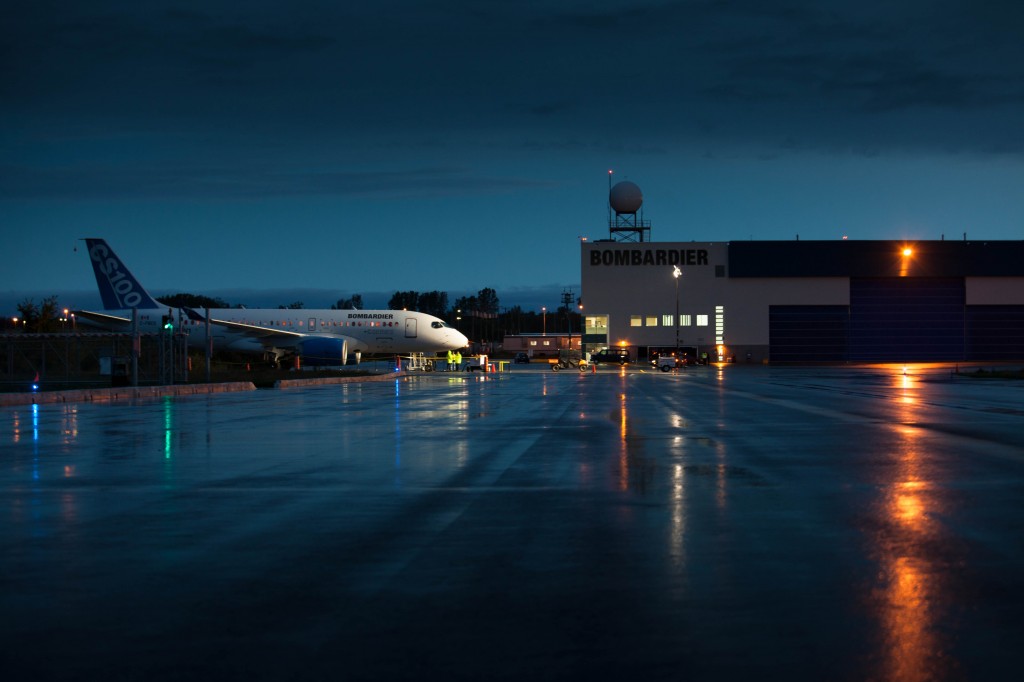
Bombardiers CSeries taxies on the runway just before dawn. (Photo: Bombardier)
MonTREAL Bombardier may get around severe Quebec winter weather by conducting some flight tests of its new CSeries commercial aircraft in the United States, the general manager of the program said Monday.
Rob Dewar told an aerospace forum that the Montreal-based aircraft manufacturer plans to use its facilities in Wichita, Kan., if weather proves challenging at its main testing centre in Mirabel, Que.
Although the flight testing will be primarily based in Mirabel, the manufacturer plans to use its U.S. facilities to continue accumulating the required hours of testing before the aircraft can gain certification.
If we have a week of solid snow storms here, then its difficult to get credit because you have to have to right environment conditions, he said in an interview after addressing Aero Montreals aerospace innovation forum.
In addition to occasional testing of the first two flight test vehicles, Wichita will be used to test the complex avionics equipment in the third test airplane.
Dewar said the testing will be done in the U.S. because of the similarities with the Global 7000 and Learjet85 business aircraft that are made by Bombardier and tested in Wichita.
RELATED: CSeries completes first test flight as Bombardier set to take on industry giants [Photo Gallery]
He said seven Bombardier CSeries planes are in various stages of assembly, including the first aircraft set for delivery, which will have its wings joined to the fuselage in January.
Bombardier said it has conducted more than 200 hours of ground and flight testing on the CSeries, which the company has been planning for about a decade.
The CS100 test plane has travelled at altitudes of up to 25,000 feet during test flights that have lasted up to four hours long.
The results so far are very good, the comparisons are really good, he said.
Dewar said it has handed over noise data to Porter Airlines to help it win political support from Toronto City Council.
All the results are actually a little bit better than predicted, so were very satisfied with the progress.
Porter said the data submitted to the city confirm that the CS100 will meet the stringent noise constraints that govern the airport.
If final certification of the aircraft does not meet these requirements, the aircraft will not operate from Billy Bishop, spokesman Brad Cicero wrote in an email.
This has always been a key consideration of the proposal and were pleased that the results support our initial position.
Meanwhile, Bombardier announced Monday that China Express Airlines has agreed to purchase up to 16 CRJ900 NextGen regional jets for US$733 million if all options are exercised.
The airlines firm order for three planes will valued at about US$134 million a list prices. It also has a conditional agreements for five more planes and options for eight aircraft.
China Express president Wu Longjiang said it expects to triple the number of its routes to 90 by 2016 that will cover 60 per cent of Chinas regional cities.
We are confident that our fleet of Bombardier aircraft will be a very efficient and reliable asset in achieving these objectives, he said in a news release.
Industry Minister James Moore told the conference that the federal government has adopted recommendations from David Emersons review of aerospace and space programs by creating a national aerospace research and collaboration network.
Built on the work done by Quebecs CRIAQ consortium, the national program will work with the provinces and the Aerospace Industries Association of Canada to support research in collaboration with universities and research labs.
We have listened to your recommendations and that we are taking action based on that report, he said, although no specific funding was announced for the network.
The head of CRIAQ welcomed the commitment.
It means that all provinces that are interested and all Canadian companies and universities and research organizations will be able to participate in collaborative research projects like we do at CRIAQ, said president and CEO Clement Fortin.
Emerson recommended $2 million in operations and more for research projects.
Its going to be both and its going to be serious, Fortin said of the expected federal funding.
Moore also committed to provide $20 million in annual funding for the space sector and will announce the governments strategy in the new year.




